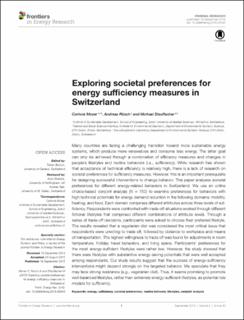Please use this identifier to cite or link to this item:
https://doi.org/10.21256/zhaw-1572Full metadata record
| DC Field | Value | Language |
|---|---|---|
| dc.contributor.author | Moser, Corinne | - |
| dc.contributor.author | Rösch, Andreas | - |
| dc.contributor.author | Stauffacher, Michael | - |
| dc.date.accessioned | 2018-01-18T15:49:53Z | - |
| dc.date.available | 2018-01-18T15:49:53Z | - |
| dc.date.issued | 2015 | - |
| dc.identifier.issn | 2296-598X | de_CH |
| dc.identifier.uri | https://digitalcollection.zhaw.ch/handle/11475/2147 | - |
| dc.description.abstract | Many countries are facing a challenging transition towards more sustainable energy systems, which produce more renewables and consume less energy. The latter goal can only be achieved through a combination of efficiency measures and changes in people’s lifestyles and routine behaviours (i.e. sufficiency). While research has shown that acceptance of technical efficiency is relatively high, there is a lack of research on societal preferences for sufficiency measures. However, this is an important prerequisite for designing successful interventions to change behaviour. This paper analyses societal preferences for different energy-related behaviours in Switzerland. We use an online choice-based conjoint analysis (N=150) to examine preferences for behaviours with high technical potentials for energy demand reduction in the following domains: mobility, heating and food. Each domain comprises different attributes across three levels of sufficiency. Respondents were confronted with trade-off situations evoked through different fictional lifestyles that comprised different combinations of attribute levels. Through a series of trade-off decisions, participants were asked to choose their preferred lifestyle. The results revealed that a vegetarian diet was considered the most critical issue that respondents were unwilling to trade off, followed by distance to workplace and means of transportation. The highest willingness to trade off was found for adjustments in room temperature, holiday travel behaviours, and living space. Participants’ preferences for the most energy-sufficient lifestyles were rather low. However, the study showed that there were lifestyles with substantive energy-saving potentials that were well accepted among respondents. Our study results suggest that the success of energy-sufficiency interventions might depend strongly on the targeted behaviour. We speculate that they may face strong resistance (e.g., vegetarian diet). Thus, it seems promising to promote well-balanced lifestyles, rather than extremely energy-sufficient lifestyles, as potential role models for sufficiency. | de_CH |
| dc.language.iso | en | de_CH |
| dc.publisher | Frontiers Research Foundation | de_CH |
| dc.relation.ispartof | Frontiers in Energy Research | de_CH |
| dc.rights | http://creativecommons.org/licenses/by/4.0/ | de_CH |
| dc.subject | Societal preferences | de_CH |
| dc.subject | Sufficiency | de_CH |
| dc.subject | Routine behaviour | de_CH |
| dc.subject | Energy | de_CH |
| dc.subject.ddc | 333.79: Energie | de_CH |
| dc.title | Exploring societal preferences for energy sufficiency measures in Switzerland | de_CH |
| dc.type | Beitrag in wissenschaftlicher Zeitschrift | de_CH |
| dcterms.type | Text | de_CH |
| zhaw.departement | School of Engineering | de_CH |
| zhaw.organisationalunit | Institut für Nachhaltige Entwicklung (INE) | de_CH |
| dc.identifier.doi | 10.21256/zhaw-1572 | - |
| dc.identifier.doi | 10.3389/fenrg.2015.00040 | de_CH |
| zhaw.funding.eu | No | de_CH |
| zhaw.issue | 40 | de_CH |
| zhaw.originated.zhaw | Yes | de_CH |
| zhaw.publication.status | publishedVersion | de_CH |
| zhaw.volume | 3 | de_CH |
| zhaw.publication.review | Peer review (Publikation) | de_CH |
| Appears in collections: | Publikationen School of Engineering | |
Files in This Item:
| File | Description | Size | Format | |
|---|---|---|---|---|
| 2015_Moser_Exploring socital preferences_Frontiers in Energy Research.pdf | 450.65 kB | Adobe PDF |  View/Open |
Show simple item record
Moser, C., Rösch, A., & Stauffacher, M. (2015). Exploring societal preferences for energy sufficiency measures in Switzerland. Frontiers in Energy Research, 3(40). https://doi.org/10.21256/zhaw-1572
Moser, C., Rösch, A. and Stauffacher, M. (2015) ‘Exploring societal preferences for energy sufficiency measures in Switzerland’, Frontiers in Energy Research, 3(40). Available at: https://doi.org/10.21256/zhaw-1572.
C. Moser, A. Rösch, and M. Stauffacher, “Exploring societal preferences for energy sufficiency measures in Switzerland,” Frontiers in Energy Research, vol. 3, no. 40, 2015, doi: 10.21256/zhaw-1572.
MOSER, Corinne, Andreas RÖSCH und Michael STAUFFACHER, 2015. Exploring societal preferences for energy sufficiency measures in Switzerland. Frontiers in Energy Research. 2015. Bd. 3, Nr. 40. DOI 10.21256/zhaw-1572
Moser, Corinne, Andreas Rösch, and Michael Stauffacher. 2015. “Exploring Societal Preferences for Energy Sufficiency Measures in Switzerland.” Frontiers in Energy Research 3 (40). https://doi.org/10.21256/zhaw-1572.
Moser, Corinne, et al. “Exploring Societal Preferences for Energy Sufficiency Measures in Switzerland.” Frontiers in Energy Research, vol. 3, no. 40, 2015, https://doi.org/10.21256/zhaw-1572.
Items in DSpace are protected by copyright, with all rights reserved, unless otherwise indicated.